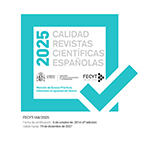Los Derechos de los pueblos indígenas como estrategias para la descolonización. Un análisis de sus potencialidades
Resumen
El objetivo de este trabajo es llamar la atención sobre la potencialidad de los derechos colectivos indígenas como estrategias para la descolonización. Dividiremos, para ello, el trabajo en varios momentos. Un primer momento en donde se recojan con claridad las interdependencias que han existido entre el discurso del desarrollo y del colonialismo en América Latina. De ahí que los derechos indígenas hagan de estos dos factores los puntales de su estrategia. Un segundo momento, en el que realizaremos un análisis de cómo es interpretado el “giro decolonial” por parte de la red Modernidad/Colonialidad en América Latina, para poner el énfasis en algunas de las limitaciones estructurales de este discurso. En un tercer momento, más propositivo, evidenciaremos cuáles son las principales aportaciones de los derechos indígenas a los procesos de descolonización y con qué principios se articulan los derechos colectivos indígenas para proponer su propio proyecto de descolonización. Finalmente concluiremos con algunas consideraciones para entender las aportaciones de los derechos indígenas como parte de ese proyecto de descolonización.
Descargas
Descarga artículo
Licencia
La revista Política y Sociedad, para fomentar el intercambio global del conocimiento, facilita el acceso sin restricciones a sus contenidos desde el momento de su publicación en la presente edición electrónica, y por eso es una revista de acceso abierto. Los originales publicados en esta revista son propiedad de la Universidad Complutense de Madrid y es obligatorio citar su procedencia en cualquier reproducción total o parcial. Todos los contenidos se distribuyen bajo una licencia de uso y distribución Creative Commons Reconocimiento 4.0 (CC BY 4.0). Esta circunstancia ha de hacerse constar expresamente de esta forma cuando sea necesario. Puede consultar la versión informativa y el texto legal de la licencia.











